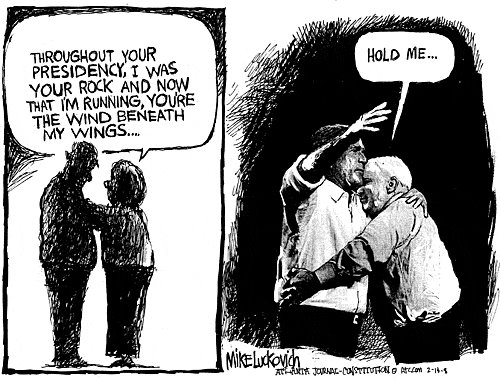With Alan Greenspan stepping down from the Fed in January, now would be a good time for the Bush administration to show how serious they are with reducing the deficit and increasing consumer confidence back in to the economy.
Bush should select Robert Rubin as the next chairman of the Federal Reserve.
Rubin, Bill Clinton's Treasury Secretary from 1995-99, knows a little about the importance of ridding the country of deficits and creating consumer and investor confidence. Rubin will also tell the Republicans in Congress to shut up and take care of 'prayer in school' issues and leave monetary policy up to him and the Federal Reserve.
And for all you Republicans who think 'deficits don't matter', read this paragraph on the 'current account-deficit' and the effect it's had on the value of the dollar.
"The U.S. dollar has lost more than a third of its value against the euro since 2002, partly because of concern the current-account deficit will damp foreigners' appetite for U.S. assets. The shortfall reached a record $665.9 billion last year, or 5.7 percent of gross domestic product".
Yeah, Republicans stick to what you do best-It's time for a Democrat to lead the country out of another one of your fiscal disasters!
Robert Rubin for Fed Chair.
'Greenspan heir needs crisis skills'
BLOOMBERG
Posted online: Saturday, August 27, 2005 at 1442 hours IST
AUGUST 27: Alan Greenspan's successor as chairman of the Federal Reserve will have to match Greenspan's skills for tackling financial market crises if risks to the U.S.economy persist, former Treasury Secretary Robert Rubin said.
``The next Fed Chairman could face - at some point in the future - an even greater need for the understanding and experience to deal with serious market difficulties,'' said Rubin in the text of a speech delivered at the Kansas City Fed's Jackson Hole, Wyoming, symposium on the Greenspan era. Greenspan is due to retire in January.
Rubin, who served under President Bill Clinton between 1995 and 1999, said the current-account deficit, rising public spending, and a low consumer savings rate are among the biggest risks facing the world's largest economy.
The current-account deficit is the broadest measure of U.S.
financial transactions with the world, and includes the trade balance.
In an earlier interview today, Rubin said U.S. presidents and congressmen have sought Greenspan's advice over the last two decades on issues ranging from tax cuts to welfare reform. Rubin said Greenspan's successor may want to avoid such contentious issues to protect the central bank's independence in its core area, setting interest rates.
``The large role that Alan played, in terms of the breadth of the issues he commented on, raises an interesting substantive question about exactly how broad the ambit of discussion should be,'' Rubin, now chairman of the executive committee at Citigroup Inc. in New York, said.
DOLLAR
The U.S. dollar has lost more than a third of its value against the euro since 2002, partly because of concern the current-account deficit will damp foreigners' appetite for U.S. assets. The shortfall reached a record $665.9 billion last year, or 5.7 percent of gross domestic product.
Greenspan said in March the deficit may narrow ``without substantial disruption'' and there is ``high probability'' it won't cause problems for the U.S. economy.
Rubin and Greenspan together tackled a range of crises during the 1990s, including the Asian financial collapse of 1997, the Russian debt default in 1998 and the failure of the Long-Term Capital Management hedge fund in the same year.
Greenspan, like all Fed chairmen, has had to guard the Fed's independence throughout his tenure. For most Fed chairman, that's meant trying to stay out of political battles. For Greenspan, it's meant toeing a delicate line between the political parties.
NO CRITICISM
Rubin, as President Bill Clinton's top economic adviser, pushed the administration to refrain from criticizing the Fed, leaving the Fed to follow the monetary policy it thought best.
George W. Bush's administration has followed the same strategy. ``The decision the Clinton administration made to not comment on the Fed and to support the independence of the Fed was exceedingly important and useful,'' Rubin said. Greenspan supported Bill Clinton's tax increases in 1993 and then supported George Bush's tax cuts in his first term. He's spoken out in support of private accounts for Social Security and urged Congress to rein in mounting deficits in 2005.
That's earned him criticism from Democrats including Sen. Hillary Clinton from New York now that the budget deficit has risen to a record. Some economists said he should have kept his opinions to himself.
BLINDER
``It is not the place of an unelected central banker to tell elected politicians which taxes to raise or reduce or which spending programs to expand or contract,'' Alan Blinder, former Fed vice chairman, said in a paper at the symposium. ``When a central banker crosses the line into the political arena, he not only imperils central bank independence but runs the risk of appearing (or, worse, of being) partisan.''
Rubin said he doesn't fault Greenspan for talking taxes, though he doesn't recommend it either. Rubin was considered a potential candidate to replace Greenspan if Democrat John Kerry had won the 2004 presidential election.
``He's handled himself quite well, but you certainly could envision circumstances with a less-skilled chairman -- or in a situation where you had a chairman and an administration at odds -- where this could become more difficult,'' Rubin said.
skip to main |
skip to sidebar







This blog is not required reading.



War Criminals
Blog Archive
-
▼
2005
(175)
-
▼
August
(58)
- FULL CIRCLE
- WHO NEEDS BOMBS?
- U.S. OFFERED HUMANITARIAN AID
- A NOBLE CAUSE? FOR WHO?
- GOOBERS FOR BUSH
- A LITTLE LATE
- JUMPED THE COUCH
- WE'LL REAP WHAT WE SOWED
- "DEAD WRONG"
- TIME FOR THE DEMOCRAT
- 'THE SACRIFICIAL LAMB'?
- WHOM WOULD JESUS WHACK?
- HEY, WHAT THE...
- DOING WHAT HE DOES BEST
- ASK AYATOLLAH SISTANI!
- VETERANS KNOW
- KILL IN THE NAME OF GOD
- A SAFE AUDIENCE?
- THEY AREN'T BUYING IT
- CARTOON EDITORIAL
- PRIORITY
- DESPERATE DESPERADOS
- THE POLITICS OF WAR
- THE SYSTEM WAS BLINKING RED
- JUST SAY NO TO DOPES
- Roadside Blast Kills Four U.S. Soldiers
- WAY BACK IN 1999
- MAYBE IT IS A GENETIC DEFORMITY
- ISRAEL, OUR BIGGEST WELFARE STATE
- MORTGAGED TO THE HOUSE OF SAUD
- THINGS ARE GETTING UGLY
- THE BOTTOM LINE VS. THE RIGHT THING TO DO
- JAWBREAKER
- THEY CALL HIM, FLIPPER
- SUNDAY MORNING HUMOR
- THEY DON'T ALL FIT YOUR PROFILE
- THERE THEY GO AGAIN?
- BEAT ‘EM, CHEAT ‘EM, BUT DON’T BANG ONE OF ‘EM
- NARAL, LET IT GO
- LETS MAKE A DEAL, JACK
- THE GOOD OLD DAYS
- 'SWIFT BOAT MOMS FOR TRUTH'
- CHICKENHAWKITIS
- YANKEES IN GEORGIA
- AUGUST 6TH
- SOMEONE NEEDS TO TAKE THE GENERAL FOR A RIDE
- WHEW! THAT WAS CLOSE!
- BUDDY BELL'S NEPHEW KILLED IN IRAQ
- SENATE SHAMEFULLY BOWS TO NRA & GUN INDUSTRY
- ONLY IN AMERICA
- IRAQ FATIGUE?
- "HONOR OURS BY TRAINING THEIRS"?
- THE GRIM REALITY
- BUSH VACATIONS WHILE OUR MARINES DIE
- DUMB & LAZY = WHAT YOU HAVE
- THE 'BROWN SHIRT' REGIME
- GOING BACKWARDS WITH REPUBLICANS
- DID WE MENTION?
-
▼
August
(58)


